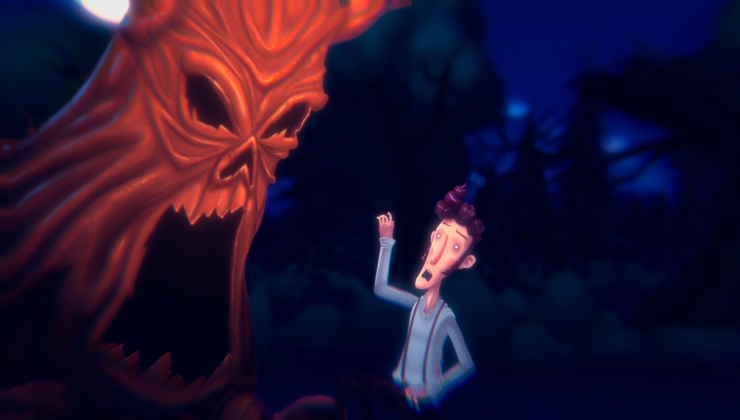A small SteamOS beta update has been released and it adds in Flatpak support. Along with a Linux Kernel bump and security updates.
From the changelog:
Valve don't actually use Flatpak, so I do wonder what they're planning with including it in SteamOS. This will hopefully at least make it easier for people adding in extra software, since they can just install a Flatpak, so it could turn out to be pretty useful.
A small, but interesting update. Showing once again that SteamOS is clearly not dead, as some like to claim.
From the changelog:
ValveUpdated Linux kernel to 4.11.12, security updates, and added flatpak and its dependencies to the repository
Valve don't actually use Flatpak, so I do wonder what they're planning with including it in SteamOS. This will hopefully at least make it easier for people adding in extra software, since they can just install a Flatpak, so it could turn out to be pretty useful.
A small, but interesting update. Showing once again that SteamOS is clearly not dead, as some like to claim.
Some you may have missed, popular articles from the last month:
All posts need to follow our rules. For users logged in: please hit the Report Flag icon on any post that breaks the rules or contains illegal / harmful content. Guest readers can email us for any issues.
Games distributed in flatpak format?
3 Likes, Who?
Games distributed in flatpak format?
No , SteamOS gained support for Flatpak.
0 Likes
Games distributed in flatpak format?
Problem is that games running on Steam needs to comfort Steam Runtime, which SteamOS already does. For flatpak games to make sense - which they do because that's what Steam already does, just on micro level - they should be more flexible.
But imho flatpak in long term makes awfully lot of sense for SteamOS and Steam for Linux.
0 Likes
Curios about how flatpak will evolve over the next year or so.
0 Likes
Yeah I understood that. Just wondering "aloud" if someone wants to distribute their game in a flatpak, and if this is about building the infrastructure for such an use case. Seems a bit far fetched now that I spelled it out.Games distributed in flatpak format?
No , SteamOS gained support for Flatpak.
0 Likes
It should definitely make it easier to add things like Spotify to SteamOS.
0 Likes
I must say that this is both quite unexpected, as well as very appreciated. No more messing about with deb repos and backports just to launch things like media centers, curious to see if we'll get a controller friendly desktop portal to go with it.
Hopefully this also means Valve are looking into cross-distro packaging of Steam games, since one of their Linux developers did comment about designing a Flatpak - then xdg-app - inspired packaging system for the runtime and applications.
Hopefully this also means Valve are looking into cross-distro packaging of Steam games, since one of their Linux developers did comment about designing a Flatpak - then xdg-app - inspired packaging system for the runtime and applications.
0 Likes
Valve clarified in the community forums that this is for adding non-Steam flatpaks to SteamOS systems and that they have no plans to drop Steam Runtime in favor of Flatpak:
http://steamcommunity.com/groups/steamuniverse/discussions/1/1458455461499646564/?tscn=1501095928#c1471966894862815665
http://steamcommunity.com/groups/steamuniverse/discussions/1/1458455461499646564/?tscn=1501095928#c1471966894862815665
3 Likes, Who?
This is not about steam runtime - flatpak has a concept of runtimes, so there should be no problem of flatpaked game to rely on the steam runtime. It would even work outside of steam - for example GOG could offer a flatpaked game relying on steam runtime, and as long the steam runtime is just a collection a opensource libraries, GOG or the game dev could host it (so that they don't rely on a different party), the flatpak installer would download it, and everything would work ootb. The only problem could be with proprietary bits, like libsteam (or whatever it's called) - they might not have rights to distribute it, so the game would need to work with it missing. This is actually one of the reasons why valve could considering allowing flatpaked games - the release story would be much simpler for developers - just a single format could be used in Steam, or on any other linux distribution, regardless of however it is distributed (directly, other store, etc). But they say they're not even considering that atm.
For the user, flatpaked games don't probably matter, because hopefully in the future the whole steam will be served as a flatpak to the user. And then all games executed from it are still sandboxed (which is probably the biggest advantage for the end user).
Their stated goal of allowing easy install of third-party apps on SteamOS is quite exciting, because it could mean more widespread use of flatpak between proprietary software makers (think Netflix, Spotify, Skype, etc). All linux users would benefit from that (everyone could install that, not just SteamOS users).
For the user, flatpaked games don't probably matter, because hopefully in the future the whole steam will be served as a flatpak to the user. And then all games executed from it are still sandboxed (which is probably the biggest advantage for the end user).
Their stated goal of allowing easy install of third-party apps on SteamOS is quite exciting, because it could mean more widespread use of flatpak between proprietary software makers (think Netflix, Spotify, Skype, etc). All linux users would benefit from that (everyone could install that, not just SteamOS users).
0 Likes
How people think that concepts such as Flatpaks are better than SteamRuntime is beyond me.
The concept of Containers means that every application provides its own required libraries. Every sane person that cares about security has to ask himself who will update these libraries? This is going to be the same we have with Windows applications that litter the disk with their own versions of outdated libraries.
A concept such as SteamRuntime with a single runtime that gets updated by the provider of that runtime (here steam) seems way saner. They take care of updating the libraries and *all* applications will instantly get the added security benefits.
Containers are a nice way to install software, no doubt, but they bring the problems Windows has had for ages to Linux. The install a bunch of software outside of the established software management system (apt, yum, whatever) which is then exempt from updates. This central software management was one of the strong points of Linux once.
While SteamRuntime also runs outside of the system package management it is still a central place that takes care of library updates and, as added benefit, you can also install all libraries provided by steam runtime through your own package management, effectively removing the update problem.
I don't really get this recent obsession with containers. It feels like a 'Windowsization' of Linux to me ...
The concept of Containers means that every application provides its own required libraries. Every sane person that cares about security has to ask himself who will update these libraries? This is going to be the same we have with Windows applications that litter the disk with their own versions of outdated libraries.
A concept such as SteamRuntime with a single runtime that gets updated by the provider of that runtime (here steam) seems way saner. They take care of updating the libraries and *all* applications will instantly get the added security benefits.
Containers are a nice way to install software, no doubt, but they bring the problems Windows has had for ages to Linux. The install a bunch of software outside of the established software management system (apt, yum, whatever) which is then exempt from updates. This central software management was one of the strong points of Linux once.
While SteamRuntime also runs outside of the system package management it is still a central place that takes care of library updates and, as added benefit, you can also install all libraries provided by steam runtime through your own package management, effectively removing the update problem.
I don't really get this recent obsession with containers. It feels like a 'Windowsization' of Linux to me ...
0 Likes
This is not about steam runtime - flatpak has a concept of runtimes, so there should be no problem of flatpaked game to rely on the steam runtime. It would even work outside of steam - for example GOG could offer a flatpaked game relying on steam runtime, and as long the steam runtime is just a collection a opensource libraries, GOG or the game dev could host it (so that they don't rely on a different party), the flatpak installer would download it, and everything would work ootb. The only problem could be with proprietary bits, like libsteam (or whatever it's called) - they might not have rights to distribute it, so the game would need to work with it missing. This is actually one of the reasons why valve could considering allowing flatpaked games - the release story would be much simpler for developers - just a single format could be used in Steam, or on any other linux distribution, regardless of however it is distributed (directly, other store, etc). But they say they're not even considering that atm.
For the user, flatpaked games don't probably matter, because hopefully in the future the whole steam will be served as a flatpak to the user. And then all games executed from it are still sandboxed (which is probably the biggest advantage for the end user).
Their stated goal of allowing easy install of third-party apps on SteamOS is quite exciting, because it could mean more widespread use of flatpak between proprietary software makers (think Netflix, Spotify, Skype, etc). All linux users would benefit from that (everyone could install that, not just SteamOS users).
A flatpaked game could also still in a Steam runtime, but it would be pretty pointless. As far as the game is concerned they both exist to containerize the application and ensure it runs the same on all hosts systems. Plus then you'd have your local libraries, the flatpak libraries, and the steam runtime inside of flatpak libraries... if you were going to use Flatpak to distribute Steam games it would only make sense if it also replaced the Steam Runtime, which is why I thought it was relevant to point out that they weren't doing that.
0 Likes
How people think that concepts such as Flatpaks are better than SteamRuntime is beyond me.Flatpak has support for runtimes, so if Steam made their runtime publicly available for anyone to use, it's exactly the same as using steam runtime in a traditional sense. Plus you get sandboxing, which limits the security holes impact even more.
...
1 Likes, Who?










 How to set, change and reset your SteamOS / Steam Deck desktop sudo password
How to set, change and reset your SteamOS / Steam Deck desktop sudo password How to set up Decky Loader on Steam Deck / SteamOS for easy plugins
How to set up Decky Loader on Steam Deck / SteamOS for easy plugins
See more from me